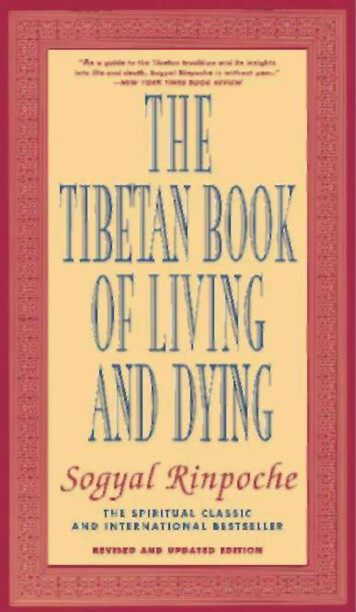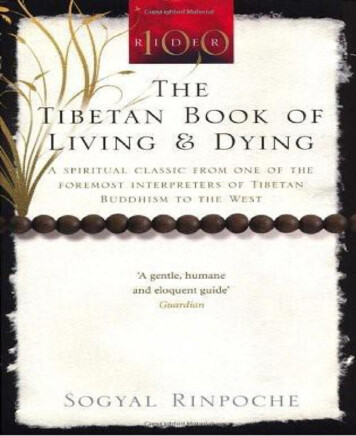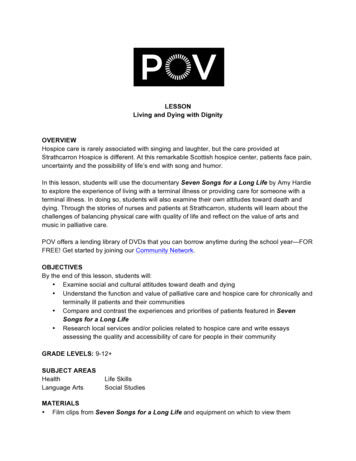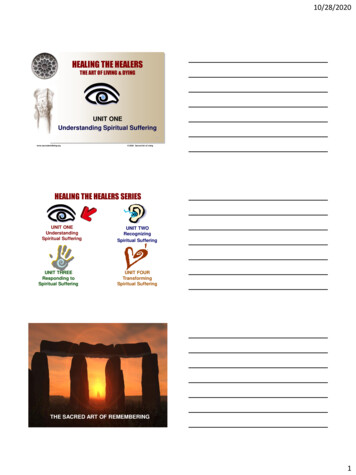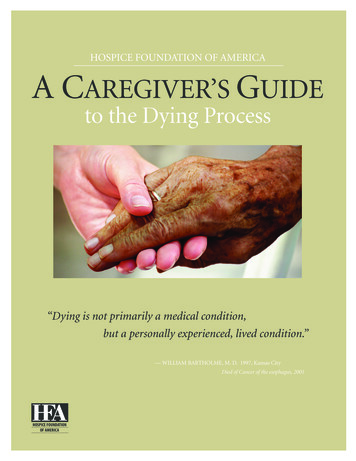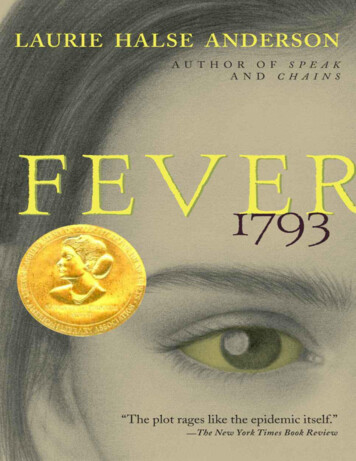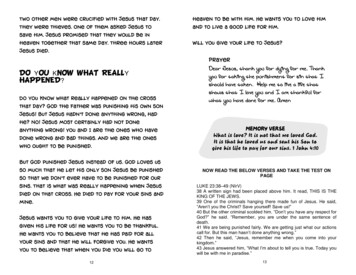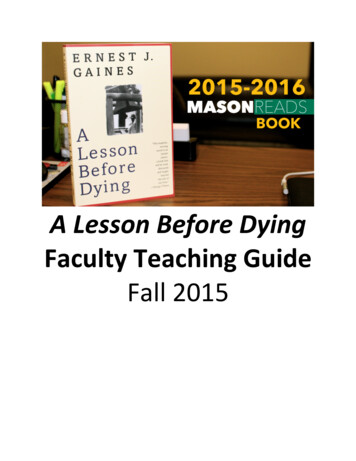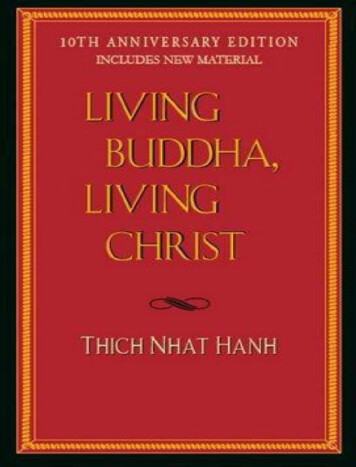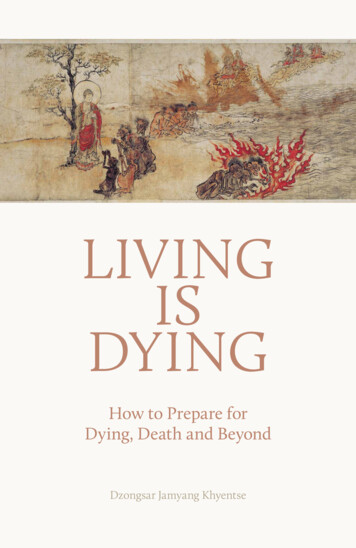
Transcription
LIVINGISDYINGHow to Prepare forDying, Death and BeyondDzongsar Jamyang Khyentse
Living Is DyingHow to Prepare for Dying,Death and Beyond
Cover Illustration:Hungry Ghosts Scroll, Kyoto National Museum, JapanThis work is provided under the protection of a Creative Commons CC BYNC-ND (Attribution-Non-commercial-No-derivatives) 3.0 copyright.It may be copied or printed for fair use, but only with full attribution, and notfor commercial advantage or personal compensation.For full details, see the Creative Commons license.
ContentsWill I Die?5Preparation for Death and Beyond25Simple Practices to Prepare for Death45How Buddhists Prepare for Death51Aspiration Practice59The Painful Bardo of Dying73Questions About Death97How to Be with the Dying105What to Say to a Dying Person117The Bardo Instructions127Questions About Caring for the Dying and the Dead145What to Do After Death161Questions About Practices for the Dead173Questions About Other Aspects of Death177For Tantrikas189Prayers and Practices195How to Practice TonglenChutor: Water OfferingIncreasing Life and Prosperity: A Method for Freeing LivesTagdrol: ‘Liberation Through Wearing’How to Make Tsatsas195199203215221
PrefaceDeath is not the opposite of life, but a part of it.1Haruki MurakamiThe instructions given to Buddhists during the process ofdying, at the moment of death and after death are the samewhether a person dies peacefully in their sleep at a ripe old ageor unexpectedly because the causes and conditions that lead tosudden death have matured.The information about dying, death and beyond that appearsin this book is a very simple presentation of one specific and ancienttradition of Buddhist teachings. Although many other authenticBuddhist traditions offer essentially the same advice, as each hasdeveloped its own terminology and language, some details mayappear to be different. Please don’t misinterpret these variationsas contradictions.These teachings about death and the bardos have been passeddown through a long lineage of brilliant Buddhist thinkers, eachof whom went to great lengths in order to examine the process inminute detail and from every angle. Their advice may be especiallyuseful for Buddhists or those attracted to the Buddha’s teachings,but it is equally relevant for anyone who will eventually die. Soeven if you are not a Buddhist, if you are open-minded, curiousor contemplating your own death or that of a loved one, you maywell find something in these pages that will help.Everything that happens to us in life and death dependsentirely on the causes and conditions that we have accumulated.Each person will therefore experience physical death and the1
L I V I NG IS DY I NGdissolution of the body’s elements quite differently. Each of ourjourneys through the bardos will also be unique. So any andall descriptions of dying, death and the bardos can only ever begeneralizations. Nevertheless, when the process of dying begins,having even a rough idea about what is happening not only goes along way towards allaying our worst fears, but it will also help usface death calmly and with equanimity.6To those of you who take notice of such details, I should say aword about the inconsistent use of Sanskrit spelling and diacriticsin this book. Usually, when Sanskrit appears in Roman charactersinstead of the Devanāgarī script, diacritics are used to help thereader pronounce words correctly. These days, as the study ofSanskrit is relatively rare, fewer and fewer of us are able to readdiacritics and, for some, the mere sight of all those squiggles anddots adds yet another level of confusion. Diacritics have thereforenot been applied to the Sanskrit terms that appear in the main bodyof the text or to the names of deities and bodhisattvas, etc., butsome have been retained in quoted texts. Similarly, where quotedtexts have included Tibetan-style spellings of Sanskrit – for examplehung instead of hum – those spellings have been retained.6Ironically, although these days I am always so busy, at heartI am unusually lazy. Trying to juggle these two extremes is quitea challenge, which is why I ended up writing much of this bookon a social networking app. If my English is at least readable it isthanks to Janine Schulz, Sarah K. C. Wilkinson, Chimé Metok,Pema Maya and Sarah A. Wilkinson.The framework of this book was created in response to a listof nearly one hundred very good questions about death that weregathered by various friends of mine. I would particularly like to2
PR E FAC Ethank my Chinese friends Jennifer Qi, Jane W. and Dolly V. T.;Philip Philippou and the Spiritual Care team at Sukhavati inBad Saarow, Germany; Chris Whiteside and the Spiritual Careteam at Dzogchen Beara; Miriam Pokora from the BodhicharyaHospice in Berlin; and all those who attended the teaching atSchloss Langenburg.I would also like to thank Orgyen Tobgyal Rinpoche, PemaChödrön, Khenpo Sonam Tashi, Khenpo Sonam Phuntsok,Thangtong Tulku and Yann Devorsine for contributing theirexpertise; Adam Pearcey, Erik Pema Kunsang, John Canti andLarry Mermelstein for generously sharing their translations; JaneW., Chou Su-ching and Vera Ho, Florence Koh, Kris Yao, ParaviWongchirachai, Seiko Sakuragi, Rui Faro Saraiva for their helpand advice; Cecile Hohenlohe and her family, Veer Singh andeveryone at Vana for their kind and generous hospitality; AndreasSchulz for designing and typesetting Living is Dying; and theartists Arjun Kaicker and Tara di Gesu for contributing theirbeautiful pictures.3
Will I Die? For the first three decades of his life, Prince Siddhartha livedan idyllic existence behind the walls of his father’s vast palace.Universally loved and admired, the handsome prince married abeautiful princess, they had a son, and everyone was happy. But inall that time, the prince never once stepped outside the palace gates.In his thirtieth year, Siddhartha asked his faithful charioteer,Channa, to drive him through his father’s great city and, for thefirst time ever, the prince saw a dead body. It was a terrible shock.“Will what happened to that man happen to me?” he askedChanna. “Will I die, too?”“Yes, Your Majesty,” replied Channa, “Everyone dies. Evenprinces.”“Turn the chariot around, Channa,” ordered the Prince. “Takeme home.”Back at the palace, Prince Siddhartha thought about what hehad just seen. What was the point of being a king if not only hisfamily but everyone on this earth had to live under the terribleshadow of the fear of death? There and then, the prince decidedthat, for everyone’s sake, he would devote his life to discoveringhow all human beings can go beyond both birth and death.This very famous story contains a great many teachings. Justthe fact that Prince Siddhartha asked, “Will I die?” is not onlytouchingly innocent, but also remarkably brave. “Will I die? Mustmighty Siddhartha, the future King of the Shakyas, whose destiny5
L I V I NG IS DY I NGPrince Siddhartha being driven out of his father’s palace by Channais to be the ‘Ruler of the Universe’, die?” How many of us, fromroyalty to ordinary people like you and me, would even thinkabout asking such a question?The question was brave, but the Prince’s reaction, “Take mehome!” sounds, on the face of it, a little childish. Aren’t adultssupposed to deal with disconcerting news more maturely? Butthen, how many adults would bother asking, “Will I die?” Andhow many would then cut short an interesting outing to examineand contemplate the answer?We human beings think we are so clever. Look at all thesystems and networks we have set up. Most of us have an addresswhere letters and packages can be sent and bank accounts wheremoney can be safely kept. A human being invented the wristwatchso the rest of us can keep track of the time; and another humanbeing invented the iPhone so that we can keep in touch with ournetwork of friends, acquaintances, business partners and family.6
W ILL I DIE?Human beings have also developed systems for making sure thatsociety runs smoothly: the police maintain public order, trafficlights control the flow of road traffic, and governments administersocial welfare and defence systems.Yet, even though we human beings have put lifetimes ofeffort into organizing, designing and structuring every aspect ofour world, how many of us have been curious and courageousenough to ask, “Will I die?” Shouldn’t we all try to contemplatethe inevitability of our own death at least once this lifetime?Particularly as every single one of us will die – itself a cruciallyimportant piece of information. Doesn’t putting a little effort intoprocessing the inescapable fact of our own death make sense?Once we are dead, what will happen to all our addresses,homes, businesses and holiday retreats? What will happen to ourwristwatches, iPhones and all those traffic lights? To our insurance and pension plans? To that roll of dental floss you boughtthis morning?Buddhists believe that of all the beings on this planet, humanbeings are the most likely to ask, “Will I die?” Can you imagine aparrot thinking, “Should I eat my nuts and seeds right now, justin case I die tonight? Or can I risk saving them until tomorrow?”Animals just don’t think like that. And they certainly don’t thinkabout causes and conditions.In fact, according to the Buddhadharma, not even the gods andcelestial beings ever think of asking, “Will I die?” The gods are farmore interested in their meticulously clean, fine porcelain saucersand silver spoons, their exquisitely brewed tea, and their entrancingmusic. The gods are said to love gazing at vast cloud formations,magically creating swimming pools or fountains in the midst ofthe largest and fluffiest, then spending hours, sometimes days,contemplating their beauty. This kind of activity dominates thelives of the gods and is far more interesting to them than asking,“Will I die?” I doubt such a thought would enter their heads.7
L I V I NG IS DY I NGHuman beings, on the other hand, have the capacity to wonder,yet the inexorability of our own death rarely occurs to us. Whendo any of us think about death? While we are experiencing terriblesuffering? No. In the midst of ecstatic happiness? Again, no. Weare intelligent and aware, and therefore enjoy the conditions thatsupport the formulation of such a question, yet we put all our timeand energy into shoring up the self-deception that we will neverdie. We numb ourselves from the pain of unavoidable realities bykeeping our minds busy and entertained, and by making elaborateplans for the future. In a way, this is precisely what makes beinghuman so wonderful, but the catch is that by doing so we create afalse sense of security. We forget that both our own death and thedeaths of all those we know and love are inescapable.Think about it: by the time each one of us has been alive for aquarter of a century, we will have lost at least one close friend orfamily member. One day you are having dinner with your parents,then the next day they are dead and you never see them again.This kind of experience forces us to face up to the truth of death –and for some it is a very bitter and terrifying truth.Fear of DeathTo fear death, gentlemen, is no other than to thinkoneself wise when one is not, to think one knows whatone does not know. No one knows whether death maynot be the greatest of all blessings for a man, yet menfear it as if they knew that it is the greatest of evils. Andsurely it is the most blameworthy ignorance to believethat one knows what one does not know. 2SocratesWhy are we all so afraid of death?There are many reasons, but the main one is that death istotally unknown territory. No one we know has ever come back8
W ILL I DIE?from the dead to tell us what death is. And even if they did, wouldwe believe them?Death is a mystery and, although we have no idea what willhappen when we die, we make all kinds of assumptions about it.We assume that once we are dead, we won’t be able to go home;that from the moment we die, we will never again sit on ourfavourite sofa. We think: if I am dead, I won’t be able to watchthe next Olympics or discover who the mole is in that new spyseries. But we are just guessing. The bottom line is, we simplydon’t know. And it is the not knowing that terrifies us.As death draws near, many of us find ourselves thinking backover our lives and feeling shame and guilt about what we have andhaven’t done. Not only do we fear losing everything that we havebecome attached to in this life and all our references, but we alsofear being judged for our shameful actions. Both prospects makethe idea of death even more terrible.There is no turning back from death and there is no escape. Itis perhaps the only event in life that we have no choice but to face.We simply cannot avoid it. Even trying to speed up the processby committing suicide doesn’t work because, as human beings,however quickly we die, fear doesn’t have an ‘off’ switch. We muststill experience the unimaginable fear that accompanies dyingbecause we cannot transform ourselves into inanimate objects,like pebbles, to ensure that we feel nothing.How, then, do we rid ourselves of our paralysing, numbing fearof death?Once I, Zhuang Zhou, dreamed that I was a butterflyand was happy as a butterfly. I was conscious that I wasquite pleased with myself, but I did not know that I wasZhou. Suddenly I awoke, and there I was, visibly Zhou. Ido not know whether it was Zhou dreaming that he wasa butterfly or the butterfly dreaming that it was Zhou.9
L I V I NG IS DY I NGBetween Zhou and the butterfly there must be somedistinction. This is called the transformation of things.3This celebrated Chinese philosopher’s question is well worthcontemplating. When you look at a butterfly, how do you knowthat you yourself are not just a small part of that butterfly’s dream?What makes you think that you are ‘alive’ right now? How canyou be sure that you are ‘living’? You can’t. All you can do is makean assumption.Think about it! How can you prove to yourself that you arealive and that you exist? What can you do? One of the standardmethods for making sure you are not dreaming is to pinch yourself.These days, some people try to feel more alive by cutting theirflesh, even their wrists. Less dramatically, others go shopping, orget married, or provoke a fight with their spouse. There is nothingto stop you from trying all of these methods. You can fight and cutand pinch to your heart’s content, but nothing you do will prove,categorically, that you are alive. Yet, along with most other humanbeings, you continue to fear death.This is what the Buddha called ‘fixation’. You fixate on themethods you use to try to prove to yourself that you exist. Yeteverything you imagine yourself to be and everything you feel, see,hear, taste, touch, value, judge and so on, is imputed – meaningit has been conditioned by your environment, culture, familyand human values. By conquering these imputations and yourconditioning, you can also conquer your fear of death. This is whatBuddhists describe as freeing yourself from dualistic distinctionswhich requires very little effort and absolutely no expenditure.All you have to do is ask yourself:How sure am I, right now, that I really am here?How sure am I that I really am alive?Merely asking these two questions will start poking holes in allyour imputed beliefs. The more holes you poke, the sooner you will10
W ILL I DIE?Zhuang Zou Dreaming of a Butterfly11
L I V I NG IS DY I NGbe able to wriggle free from your conditioning; and by doing so,you will have moved a great deal closer to what Buddhists describeas ‘understanding shunyata’. Why do you need to understandshunyata? Because by understanding and realising shunyata youwill finally conquer not only your numbing fear of death but alsothe numbing assumption that you are alive.None of your assumptions about who you are, who you makebelieve you are, or the labels you attach to yourself is the real ‘you’;it’s all guesswork. And it is this very guesswork – assumption,make-believe, labelling and so on – that creates the illusion ofsamsara. Although the world around you and the beings within it‘appear’, none of it ‘exists’; it’s all a fabricated illusion. Once youfully accept this truth – not just intellectually but practically –you will become fearless. You will see that just as life is an illusion,so is death. Even if you cannot fully realize this view, becomingfamiliar with it will reduce your fear of death exponentially.This point is worth repeating. Fear is unreasonable andunnecessary, especially fear of death, and a huge chunk willinstantly dissolve once you have truly accepted that all that appearsand exists is merely a learned and fabricated illusion.So, how do we come to accept that samsara is an illusion?Life Is an IllusionThere are a number of methods available to those who areeager to fully realize the illusory nature of life and death. In fact,the sole aim of all the Buddha’s teachings is to realize that eachand every samsaric phenomenon is an illusion.Start by listening to as much information as you can aboutthe illusions that are ‘life’ and ‘death’ – a subject none of us canhear enough about. And don’t make the mistake of thinking thatlistening and hearing are not authentic Dharma practices becausethe opposite is true.12
W ILL I DIE?Next, contemplate what you have heard and learn more byreading books.Finally, and most importantly, try to get used to what youhave learned. How? There are many methods for getting used tothe idea that life is like a dream. The simplest and most effective isto ask a few questions. Just ask. There’s no need to come up withany answers.Emulate Zhuang ZhouLike Zhuang Zhou, gaze at a butterfly and ask yourself,Is this butterfly dreaming me? Am I this butterfly’s dream?Pinch YourselfPinch yourself – gently or roughly, it’s up to you – andask yourself,Who is doing the pinching? Who is feeling the pinch?Just Know and Watch Your ThoughtsAt this very moment, you must be thinking something. Asyou think it, just know you are thinking that thought.If you are thinking a bad thought, don’t let it lead you tothink about another thought – good or bad. Whatever theoriginal bad thought, just watch it.If you are thinking a good thought, just watch it.If you are thinking about your car keys, just know that youare thinking about your car keys.As you think about the car keys, if you suddenly fancy a cupof tea, just know that you are thinking about a cup of tea.Don’t try to finish off the thought about the car keys.If you feel overwhelmed by your fear of death, just look at it.Don’t think about what you think you should be doing orhow you think you should be doing it.13
L I V I NG IS DY I NGThese few exercises will, at the very least, help you understandthat a large part of your outer and inner world is nothing butassumption and projection.Relax Your ExpectationsIf you have neither the time nor the inclination to becomeacquainted with the view that samsara is an illusion, try, while youare still alive and healthy, not to get too attached to your plans,hopes and expectations. At the very least, prepare yourself for thepossibility that nothing will work out. Everything good in yourlife could, in the blink of an eye, become the exact opposite; andeverything you value could suddenly become worthless.Imagine that your best friend moves to the other side of thecountry. You meet very rarely and over time become emotionallydistant from each other. One day he writes something on socialmedia that offends you deeply, and suddenly he is your worstenemy. Life is full of this kind of reality-check.Becoming aware of how things change is a useful form ofmind training, and letting go of all your attachment to planning,scheduling and expectation will reduce your fear of deathconsiderably. If you never experience disappointment or failurewhile you are alive, when you find yourself at death’s door, youwill be terrified. Of course, by then it will be too late for you todo anything for yourself. If you are lucky, your friends and familymight be willing to take responsibility for gathering the causesand conditions to soothe and encourage you. And if you are verylucky, they won’t try to deceive you into believing that you willlive forever. The best thing any of us can do for a dying person isnot to lie about what is happening to them.Reduce Your SelfishnessSelfishness and greed cause the most intense kind of fear. Wewill all be alone once we are dead, but if your habit is constantly14
W ILL I DIE?to act out your self-obsession in front of an admiring audience,you will find the solitariness of death unbearable. Having becomeso used to the admiration of sycophants who indulge yourevery whim, when you find yourself entirely alone, you will beoverwhelmed by unimaginable fear. So, by reducing selfishnessyou can reduce the intensity of your fear.Reduce Your Attachment to Worldly LifeSome people are afraid of death because they are afraid ofphysical pain. But not everyone dies in pain. Whether you do ornot will depend on your karma. As each person’s karma is quitedifferent, each person’s experience of death will be unique. Somepeople will not realize they are dying. Others may not even realizethat they are dead and have been dead for days or weeks. Deathcan strike suddenly, like a bolt of lightning, or agonizingly slowly.And the vast majority of the pain suffered at death is caused by anemotional attachment to life, possessions, friends, family, propertyand fretting over unfinished business.Living Is DyingSince I was bornI have to die,and so 4KiseiWill nothing help at the moment of death?Everything we human beings do, think and feel while we arealive is driven by ignorance, emotion and karma. And it’s ourignorance, emotion and karma that conspire to ensure that weall have to face both birth and death entirely alone. We have nochoice. Once we have been born, nothing and no one can preventus from dying. The inevitability of death is initiated at birth andwe are powerless to resist it.15
L I V I NG IS DY I NGIf you don’t want to experience the helplessness and lonelinessof death and rebirth, you must gather the causes and conditionsfor never being reborn again while you are still alive.At the moment of death, you may find yourself surrounded byrelatives and friends, but it is extremely unlikely that they will beof any use to you – they may even make things worse. What if, asyou breathe your last, you realize that, like vultures, your greedyrelatives are already fighting over who gets what? That before yourcorpse is cold they will be stripping your beautiful home of all itstreasures, hacking into your email accounts and breaking openyour safety deposit boxes. As they stand at your deathbed, theymay be squabbling over who gets your priceless Louis Quinze deskand your worthless nephew may be leafing through one of yourprecious first editions. Conversely, having those you love and wholove you at your bedside as you pass away could make the pain ofseparation unbearable.The gross human mind tends to think of death as the finalseparation of body from mind. A more precise description is thatdeath marks the end of a period of time. Throughout so-called ‘life’,we are therefore experiencing a continuous stream of ‘deaths’.The death of death is birth; the death of birth is abiding; thedeath of abiding is the birth of death. Everything you experienceis simultaneously a death and a birth and if you are subject to thephenomenon called ‘time’, you will also be subject to death.What is generally known as ‘life’ or ‘living’ is full of incident,but death, which is perhaps the most significant of all life’s events,is quite the opposite. If you were to die tonight you would lose youridentity and all your possessions, and not one of your plans wouldmaterialize. This is why death is such a big issue. For most of us,birth is far less of a worry and certainly nowhere near as frighteningas death. In fact, we love births. Once a baby has been born, wecongratulate the parents, then relentlessly commemorate its birthdayfor the rest of its life. An entire industry is now dedicated to servicing16
W ILL I DIE?birthdays: birthday cakes, birthday parties, birthday surprises and,of course, birthday cards are all available at the click of a button.Without having to lift a finger, social media makes it impossible forany of us to forget a single birthday – not even the cat’s.Unlike us, the great Mahayana masters thought of birth as amuch greater hurdle to overcome than death. Nagarjuna, the greatIndian scholar and mahasiddha, told his friend, the king5, that fora spiritual person, birth is far more disturbing and a much biggerissue than death could ever be.So, why do spiritual people value death over birth? Birth is theone event in this life over which we have absolutely no control.We pop out of our mothers’ bodies without having been asked asingle question. We have no say about where we are born, who ourparents are, the day and hour of our birth, or even if we should beborn in the first place. Every aspect is out of our hands.The knowledge that we have been born is of no help whatsoeverat any stage in our lives, whereas the knowledge that death isinevitable continually urges us to appreciate what we have rightnow. Knowing that we must die helps us to make the most of life.Knowing that death is imminent and certain is what makes itpossible for us to love and to remain sane. It also prevents us frombecoming desensitized and numbed by worldly life. For most ofus, life is intoxicating; thinking about death is perhaps the onlymethod available that can truly sober us up.If you have been born, you will have to die; and if you areabout to die, you will have to be reborn. How do we cut this cyclicgame of birth and death? By realizing a state of awakening. Onceyou have been ‘awakened’ or become ‘enlightened’, you will nolonger gather the causes and conditions that result in death andrebirth. But until then, you will be reborn and you will die, overand over and over again.As birth and death are inseparable, we should mourn birth justas much as we mourn death. Especially these days. Just think for17
L I V I NG IS DY I NGone second about what your children will have to go through asadults. One day, your daughter will walk into a department storeand become mesmerized by all manner of tantalizing phenomena –just the glossy red lipsticks alone will be utterly thrilling, not tomention the stationery. After that, there will be no avoiding theworld of gourmet coffee and Starbucks, or fashion and wellnessresorts, or bank balances and the concept of money. Wow! Herlife will be tough.Is There an Upside to Death?Facing death helps us appreciate what it is to be alive, but hardlyanyone thinks like that these days. Most modern people liveblindly, completely ignoring the inevitability and unpredictabilityof death.Buddha NatureAccording to Buddhadharma, death teaches us one extremelypositive truth: that the nature of each and every sentient being’smind is the Buddha; that the nature of my mind and the nature ofyour mind is the Buddha.Buddha nature isn’t some exotic New Age theory or occultphenomenon. Because you have buddha nature, whatever you do,wherever you are, the essence of your mind is the Buddha.Feel the texture of the book or device you are holding, listento what is going on around you, feel the softness of the cushionunder your buttocks or the weight of your body on the soles ofyour feet. Think about the words you are reading: the essence ofyour mind is the Buddha.The mind that does everything I have just mentioned – yourown very ordinary mind – is the Buddha. Not only is your mindthe Buddha, the ordinary mind of every sentient being that is aware,reads, sees, hears, tastes, and so on, is also the Buddha.18
W ILL I DIE?Think of a glass of muddy water. Even though the water itselfis pure and clear, when stirred, it mixes with the mud and what wesee is muddy water. In the same way, our basic lack of mindfulnessand awareness stirs up all manner of thoughts and emotions thatthen mingle with and muddy our pure, clear mind.Watch Your MindYou can experience how this works right now. Stop reading forthree minutes and look at your mind.Now, ask yourself:How long was it before a thought popped into your mind?How long before you started thinking about that thought?And how long before you were completely lost in that thought?The process of one thought leading to another is a familiarone. Imagine you are waiting for a friend to pick you up to takeyou to a party. You start feeling excited the moment you hear thetoot of a car horn. Who will be at the party? What will the foodbe like? Will there be party games? Will it be fun? And before youhave even set foot outside your front door, let alone arrived at theparty, you are already lost in thought.Most of us lack any form of mindfulness and so we never seehow our minds get entangled in our emotions and our bodies’gross preoccupations about friends, family, values, philosophies,political systems, money, possessions and relationships. For ourentire lives, the awareness that is our buddha nature is blinded,diluted, befuddled, blurred and dulled by unfettered thoughts,until we become so swamped with feelings, confusions,expectations and complications that it’s as if the nature of themind didn’t exist.At the moment of death, whether you are a seasoned Buddhistpractitioner, the CEO of Google, a Wall Street trader or a materialist19
L I V I NG IS DY I NGof any kind, the natural process of dying will force your mind toseparate from everything you have ever known. Obviously, thismeans separation from your friends, family, house, the park andthe gym, but it also means separation from the one thing that hasbeen with you for your entire life, 24 hours a day, seven days aweek, even while you sleep: your body. When you die, your wholebody, including its
LIVING IS DYING 2 dissolution of the body’s elements quite differently. Each of our journeys through the bardos will also be unique. So any and all descriptions of dying, death and the bardos can only ever be generalizations. Nevertheless, when the process of dying begins, having even a rough idea about what is happening not only goes a
